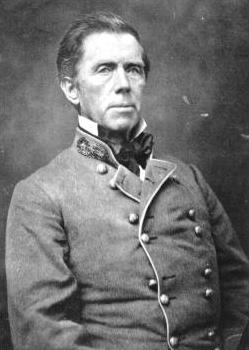- William "Extra Billy" Smith
Infobox Governor
name = William Smith
order = 30th & 35th
office = Governor of Virginia
term_start =1846 ndash1849 1864
term_end =1865
lieutenant =Samuel Price
predecessor =James McDowell John Letcher
successor =John B. Floyd Francis Harrison Pierpont
birth_date = birth date|1797|9|6|mf=y
birth_place =Marengo, Virginia
death_date = death date and age|1887|5|18|1797|9|6|mf=y
death_place =Richmond, Virginia
party = Democrat
spouse =
profession =Politician ,Lawyer
religion =William Smith, nicknamed Extra Billy (
September 6 ,1797 ndashMay 18 ,1887 ) was alawyer , congressman, two timeGovernor of Virginia and one of the oldest Confederategeneral s in theAmerican Civil War .Early life and politics
Smith was born in Marengo,
King George County, Virginia . He attended private schools inVirginia and Plainfield Academy inConnecticut . He then studied law and was admitted to the bar and commenced practice in Culpeper,Culpeper County, Virginia , in 1818. He established a line of United States mail and passenger post coaches through Virginia, the Carolinas, and Georgia in 1831. It was in this role that he received his nickname. Given a contract by the administration of PresidentAndrew Jackson to deliver mail betweenWashington, D.C. , andMilledgeville, Georgia (then the state capital), Smith extended it with numerous spur routes, all generating extra fees. During an investigation of the Post Office department, Smith's extra fees were publicized and he became known as Extra Billy in both the North and South.Smith served as a member of the State senate from 1836 to 1841, when he resigned. Smith successfully contested as a Democrat the election of
Linn Banks to the Twenty-seventh Congress and served fromMarch 4 ,1841 , toMarch 3 ,1843 . He failed to be reelected in 1842 to the Twenty-eighth Congress. He then moved to Fauquier County.Smith served during the
Mexican-American War as Governor of Virginia from 1846 to 1849 and was an unsuccessful candidate for election to theUnited States Senate during that period. He moved toCalifornia in April 1849 and was president of the first Democratic State convention in 1850. He returned to Virginia in December 1852 and was elected to the Thirty-third Congress and to the three succeeding Congresses (March 4 ,1853 ndashMarch 3 ,1861 ).Civil War
When Virginia seceded from the Union, Smith declined to accept a commission as a
brigadier general because he rightly admitted he was "wholly ignorant of drill and tactics". A few weeks after the war started, he was present during a Union cavalry charge in Fairfax Court House. He took command of the Confederate troops after the death of their commander and found he enjoyed the experience. He requested a commission and was appointedColonel of the 49th Virginia Infantry regiment just three days before theFirst Battle of Bull Run , where the regiment and new commander performed well.Smith served in the
Confederate Congress in 1862, but returned to the 49th Virginia at the start of thePeninsula Campaign . He was wounded at theBattle of Seven Pines and his regiment received favorable notice in his commander's report. During theSeven Days Battles the regiment was lightly engaged, but he and his command again were described as having "characteristic coolness" and "fearlessness." He was known for expressing contempt for West Point graduates ("West P'inters") and their formal tactics, recommending common sense to his men instead of a military education, and distinguished himself with his unorthodox field uniform, including a tallbeaver hat and a blue cotton umbrella.At the
Battle of Antietam , Smith temporarily commanded a brigade in Maj. Gen. Jubal Early's division. He was wounded three times, but continued to command, and Maj. Gen.J.E.B. Stuart wrote that he was "conspicuously brave and self-possessed." By the end of the battle he had to be carried from the field. In recognition of his performance, he was promoted to brigadier general as ofJanuary 31 ,1863 . He commanded a brigade in theBattle of Chancellorsville , but achieved no distinction in this role.By the time of the
Gettysburg Campaign , Smith's superiors were leery of his performance, but had to provide subtle influence because he was the former governor of Virginia. Early directed Brig. Gen.John B. Gordon to keep close contact with Smith and effectively exercise a joint command over their two brigades. During theBattle of Gettysburg , Smith refused to pursue retreating Union XI Corps troops, concerned that a Union force was approaching from his left, which was a significant reason that the Confederates failed to attack and takeCemetery Hill onJuly 1 ,1863 . Smith was the oldest general on the field and fought (unsuccessfully) the oldest Union general, Brig. Gen.George S. Greene , atCulp's Hill onJuly 3 ,1863 . He was the only general not commended in Early's official report and, as a result, decided to resign his commission onJuly 10 . He nevertheless received an essentially honorary promotion to major general and AssistantInspector General onAugust 12 and performed recruiting duty in Virginia.Postbellum career
Smith was elected again as Governor of Virginia and served from
January 1 ,1864 , to the end of the war. He was removed from office and arrested onMay 9 ,1865 , but was paroled onJune 8 . He returned to his estate,Monterosa , nearWarrenton, Virginia , where he engaged in agricultural pursuits. At the age of eighty, he became a member of theVirginia House of Delegates (1877–79). He died inWarrenton, Virginia , and was buried inHollywood Cemetery ,Richmond, Virginia .References
*Eicher, John H., and Eicher, David J., "Civil War High Commands", Stanford University Press, 2001, ISBN 0-8047-3641-3.
*Tagg, Larry, [http://www.rocemabra.com/~roger/tagg/generals/ "The Generals of Gettysburg"] , Savas Publishing, 1998, ISBN 1-882810-30-9.
*Warner, Ezra J., "Generals in Gray: Lives of the Confederate Commanders", Louisiana State University Press, 1959, ISBN 0-8071-0823-5.
*bioguide
Wikimedia Foundation. 2010.
